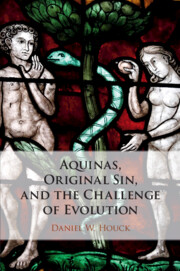Book contents
- Aquinas, Original Sin, and the Challenge of Evolution
- Aquinas, Original Sin, and the Challenge of Evolution
- Copyright page
- Dedication
- Contents
- Acknowledgments
- Introduction
- 1 Augustine and the Long Twelfth Century
- 2 Aquinas on Original Justice
- 3 Aquinas on the Effects of Original Sin
- 4 Aquinas on Original Guilt
- 5 Original Sin and Some Modern Theologians
- 6 Original Sin and the Challenge of Evolution
- 7 Original Sin
- 8 A Response to Some Objections
- Conclusion
- Select Bibliography
- Index
5 - Original Sin and Some Modern Theologians
Published online by Cambridge University Press: 22 February 2020
- Aquinas, Original Sin, and the Challenge of Evolution
- Aquinas, Original Sin, and the Challenge of Evolution
- Copyright page
- Dedication
- Contents
- Acknowledgments
- Introduction
- 1 Augustine and the Long Twelfth Century
- 2 Aquinas on Original Justice
- 3 Aquinas on the Effects of Original Sin
- 4 Aquinas on Original Guilt
- 5 Original Sin and Some Modern Theologians
- 6 Original Sin and the Challenge of Evolution
- 7 Original Sin
- 8 A Response to Some Objections
- Conclusion
- Select Bibliography
- Index
Summary
Chapter 5 engages proposals that deny the importance of a historical Fall. I begin with Kant’s account of radical evil. An influential reading is this. Every human being who reaches the age of reason freely subordinates the moral law to self-interest. Next is Karl Barth’s “christologized” version of radical evil: the Fall is the universal act of unbelief in Christ. I argue that the reduction of original sin to the universality of actual sin is insufficiently inclusive. Neither infants nor the severely mentally disabled choose wrongdoing. Schleiermacher separated original sin from the Fall in a different way. Original sin is the corporate act of humanity. The “force” of sin is present in infants, albeit in germinal form, and when they mature they lack God-consciousness and tend to sinful self-love. Schleiermacher’s view leads to a problematic conclusion. Either sin is numerically one, or sin is merely environmental, external to the will. Schoonenberg defends a similar view but stresses human freedom. McFarland intriguingly proposes a synthesis of Maximus’s and Augustine’s accounts of the fallen will, while arguing that we can avoid etiological explanations of sin altogether. I argue, however, that we have to choose: we need either to explain why original justice is theologically unnecessary or to defend it in some form.
Keywords
- Type
- Chapter
- Information
- Aquinas, Original Sin, and the Challenge of Evolution , pp. 138 - 178Publisher: Cambridge University PressPrint publication year: 2020

